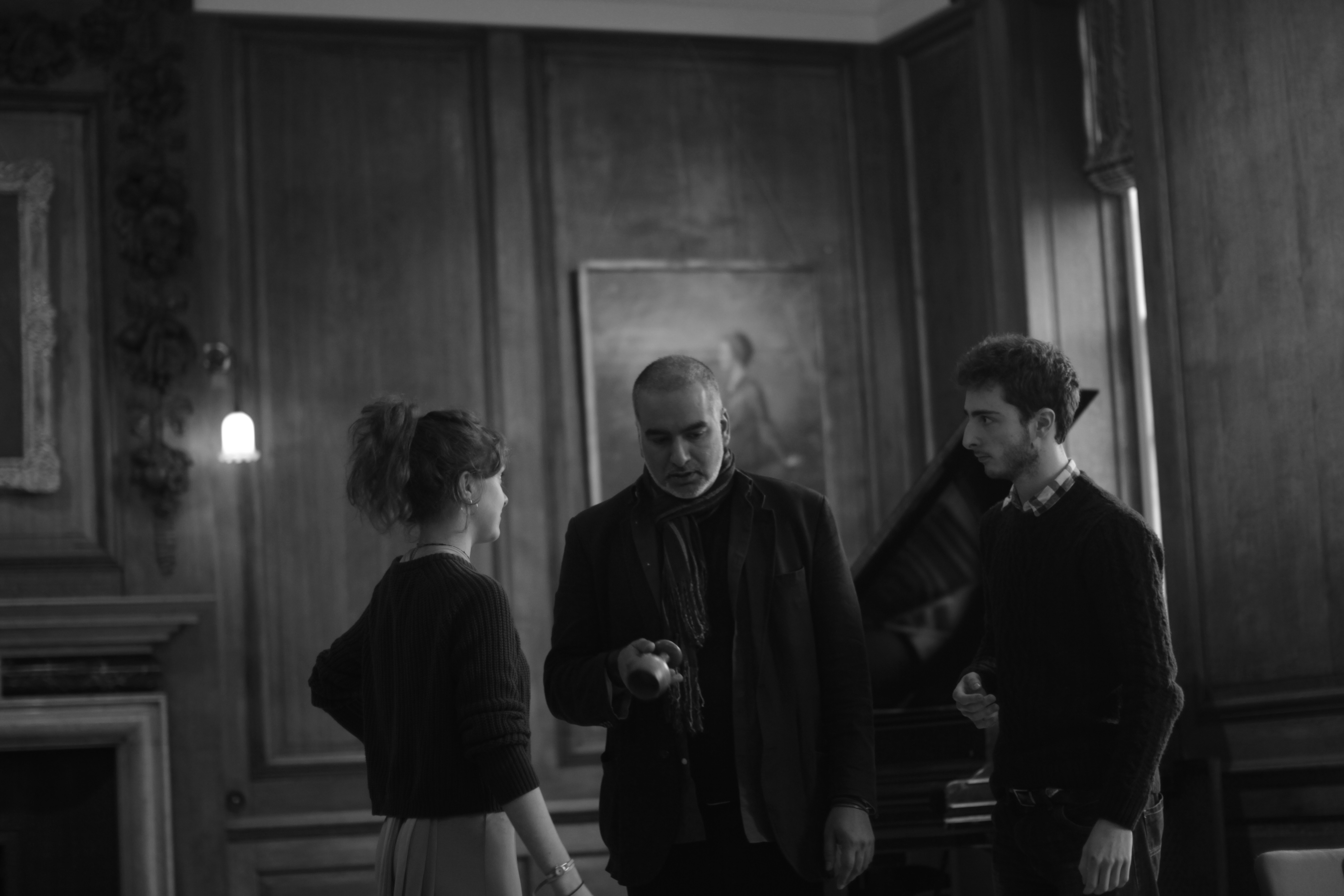
Iqbal Khan lets his guard down
Yesterday, Oxford student Livi Dunlop joined with Iqbal Khan for a one-night showstopper at the Keble O’Reilly: The Changing of the Guard, by Shomit Dutta. Dunlop is known in Oxford for acclaimed productions of Orlando and Pussyfooting, while Khan has become notorious for his innovative and challenging takes on Shakespeare—including a production of Much Ado About Nothing set in something like modern day New Delhi, and Othello with a black Iago—alongside multiple critically acclaimed productions such as East is East, Snookered and Madame Butterfly.
Squeezing our twenty-minute interview into one of four ten-hour days of rehearsals, Khan was less frantic and overcharged than the Oxford directors I’m more used to interviewing. Calm, gentle and softly spoken, he seemed to think hard about my questions, expressing himself with care and charm.
I’m really excited to see the play—what made you want to work with Oxford students, and in particular in such an intensive way with only a few days to rehearse?
Iqbal Khan: Well, the first thing is Shomit’s play—it’s an extraordinarily rich and ambitious piece and we thought the best way to share it with people—to sell it to people—was to put on as much of a performance of it as we could. We then thought about who we might do that with, and I love working with students, I love their curiosity, their courage. We formed this idea that potentially we could use a residency here in Oxford to, on the one hand, give the students and the members of Oxford University Dramatic Society an experience of working with a professional director—working on a new play—and, at the same time, have what we hoped would be exceptional young people trying to realise the world of the play.
So what should audiences be expecting?
It’s set towards the end of the Trojan wars—we’ve had ten years of bitter struggle. The week before Achilles has been killed by Paris and the world of the play is split in two. We have the downstairs world, which is the world of the guards, guarding Helen’s inner sanctum, and the upstairs area is sort of Helen’s perfumed rooms. Those are the two worlds of the play. The two guards downstairs, this is their final day of service—they have a contract which comes to an end today—once they see out this day they can leave the war, they can go back to their homes, they can live their lives. And upstairs on this final day, a stranger breaks into the upper apartments and there is this intrigue upstairs—it’s an erotic intrigue, it’s a suspense-filled political intrigue that’s happening upstairs. I’m not going to tell you who it is upstairs, but it’s a significant figure. So the piece sort of charts the concerns of the people upstairs and those of the people downstairs as things start to go wrong. And it’s very funny—it feels like the world downstairs has Pinter-wit, Pinter-danger, and despite the fact that the tone of it is often very funny, ultimately it has a sort of tragic trajectory.
What made you want to work on a classical spin-off?
Well, I’m very interested in working with plays that have big ideas—I think the thing that theatre does uniquely well is the word, the idea, the argument, and I’m slightly disappointed that a lot of new plays are dominated by situation, and by the perhaps lurid circumstances of the story rather than the importance and the significance of the character and the idea and the word at the centre of that—so I love plays that are ambitious with language and ambitious in the scope of their ideas and this is that sort of play. I read it and I saw that it moves through so many different kinds of tones. It’s very exciting—it’s very difficult. And in the time that we have, it’s a real challenge we’ve set ourselves to try and do it justice, but we’re doing quite well—we’re doing very well, I think.
Would you say that it’s the same ‘big ideas’ that’s drawn you to Shakespeare in the past?
Yeah—anything, any play that I do … Any project that I’ve been involved with, I always look for either the challenge of the material itself, the ideas and the argument and the importance of those things, or the challenge of the form. And it doesn’t always have to be ‘serious’, but I like things that are intricate and meaningful and beautifully done.
What you were saying about ‘lurid situations’ reminded me of something you said in an interview in response to being called a ‘crusader’ because of some of the work you’ve done with race. You objected to that because you didn’t want to be pigeonholed in that way.
Yeah, and I object to the word—I think the word has really unfortunate connotations.
Definitely. But you were talking about ‘big ideas’—what do you think of plays that have an express political message—was your objection related to this in any way? Is that the kind of theatre that you like to work on?
Absolutely. Absolutely—and the thing is, as I say I object to the connotations of that word. That’s not to say that I don’t see myself and I wouldn’t like to see myself as an advocate for strong ideas and bringing to light important stories that are neglected. The story of the neglected is a very important pull to people—there are lots of things that interest me and that I want to represent—not to crusade for but to advocate for. Having said that, I also enjoy being a servant to the thing. I enjoy enabling my actors in the rehearsal room discovering things, I enjoy giving my audiences an experience that will thrill them as well as challenging them, I enjoy serving the playwright’s visions. It’s not my voice, ultimately—it’s the voices of others that I’m hoping to liberate and articulate.
You’ve done a lot in the past to represent actors of colour and you’ve made comments about how you don’t want to consign individual roles to having to represent people of colour. Do you think it’s possible for people of colour to become more represented on the stage without directors like you pushing that in your plays?
I think it’s hard. I think it’s hard unless we take responsibility, theatre makers take responsibility. Of course the gatekeepers, the people that form its strategy are incredibly important but it’s also our responsibility to use our imaginations to allow for a greater range of people who make the work. I don’t think this is about, ‘we need to get more brown people in white people’s roles’. I think it’s about embracing the fact that, particularly in theatre, it’s not really a naturalistic frame. We can tell historical dramas, but we don’t have to cast it with absolute verisimilitude. There is a leap of belief that theatre allows us to take when we walk into a blackened room and there’s a wall missing where from the reality on the stage, we’re immediately making that link and I think we can easily make that link when it comes to casting that’s not absolutely as it would be in real life. And that gives us other connotations and possibilities with the character. It’s just about conviction—it’s about a coherent vision in theatre-making. And I think the more we represent either the stories of the ‘other’ or in telling the canonical stories, if we can find new ways of doing them—that would shatter the old frame, as it were, that would bring about the momentum of change.
What you’re talking about reminds me of Emma Rice’s plans for her Shakespeare season and her plans for a fifty-fifty gender split, and Livi just told me that you’re going to be directing a play, Macbeth, for that. Can you tell me anything about that?
I can tell you that I’m very excited about being involved in the season—I’m very excited because of her ambition. I love the globe as a space. I love the audience at the Globe—they’re incredibly hungry and passionate. I think there has been a tendency, unfairly, for it to be regarded as heritage theatre. And I think that’s to do with the fact that plays there are often not as theatrically immersive as they might be and Emma has an ambition to be much bolder in how we transform the experience of audiences as they walk into that space, and that’s exciting. I’m very excited about that. I’m very excited about how she’s stated, she has given all artists working there, the provocation that they should think more diversely. There’s no prescription but there is a provocation, and I can tell you now that I will embrace that whole-heartedly in terms of my casting, I will absolutely embrace it. I don’t think it’s appropriate at this stage to tell you how I will cast. I’m always interested in asking the radical question that challenges the easy assumptions that are made about plays. And so whenever I start working on any play I always ask why has it been done in this way, and is that still appropriate? And I ask that at the most basic level. And any innovations that I might provide comes out of me challenging what I feel have become complacent assumptions.
What’s your view of the other end of the spectrum—the all-male, period-dress, traditional productions that we’ve seen at the Globe in the past?
I think it’s fantastic. I think any of that kind of innovation, well it’s not necessarily innovation, but I think everything should be allowed. I think the same-gendered production, whether it’s all-female or all-male, whether you invert the genders—all of those sorts of experiments should be allowed. If you want to do something that’s more naturalistic, more realistic, all of that should be allowed. What I don’t like is the sense that there seems to be a privileged register for how things should be done—I think there should be a freedom in terms of the choices you should make. Particularly when it comes to works like Shakespeare, where I would suggest that any sort of authoritative stance is nonsense, because there is no authority as such. There is so much that is provisional in our understanding of these things—I don’t regard them as sacred texts. They’re incredibly important, but these words, ‘sacred’ and ‘reverent’, they ossify the imagination. I think it’s very important to challenge all those things.
I was very interested in something you said in a previous interview about Shakespeare—you said that you always wanted to make Shakespeare feel urgent and contemporary. I loved your production of Much Ado About Nothing, but wondered whether what you were aiming for was to take this plot and transpose it onto something more relatable or colourful for the audience, or whether you were instead using the play’s plot to make a comment on that society.
You end up doing both of those things, don’t you, often. In that instance I suppose, even though it was more theatrical, it was more realistic—I was trying to create the world of New Delhi, now. And I suppose the most important thing to say is, it felt like a fantastic lens to tell the story of the play. I didn’t feel it distorted the play—it felt like a really wonderful way of refreshing, reimagining the play for the modern day. That’s one thing. The selection of the frame changes your understanding of what is framed, i.e. the play, but at the same time to select that frame one is making a decision—one is making a choice and a comment is being made about the world and why that particular frame.
It was interesting to see that the play drew in a very different demographic to most RSC productions, especially South Asians. This always happens at plays that seem to be about racial issues—is this the best way to diversify theatre audiences?
I think it’s a way. What you hope with experiments like that is that it will bring in a new audience and maybe refresh the experience of the old audience—it should appeal to both and shouldn’t exclude anyone. But the worry for me is that what can happen is it can ghettoize audiences—this season is for the brown audience. That’s what we have to be careful of—we need to be careful that your old audiences aren’t excluded. What I’m hoping is that this version of the play illuminates something about the playwright for them, and that they fall in love with the play so that if there’s another production of Much Ado done in any way, they will go and see it because they maybe start a journey to do with the enjoyment of those plays and theatre in general. The ambition is that you don’t just want them to come to one production, you want them to carry on, because that’s when you know you’ve achieved genuine radical change.







